Comfort and Care in Action—Tzu Chi Responds to Taiwan’s Train Crash
By Yeh Tzu-hao (葉子豪)
Photos by Michael Xiao (蕭耀華)
Translated by Wu Hsiao-ting (吳曉婷)
Comfort and Care in Action—Tzu Chi Responds to Taiwan’s Train Crash
By Yeh Tzu-hao (葉子豪)
Photos by Michael Xiao (蕭耀華)
Translated by Wu Hsiao-ting (吳曉婷)
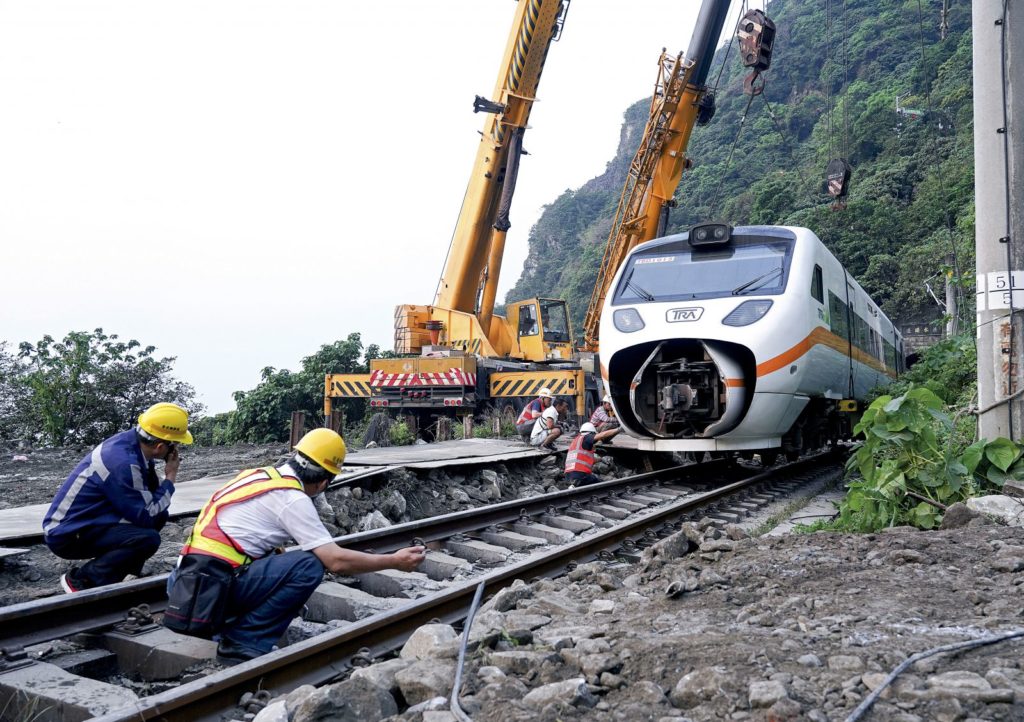
On April 3, the day after the rail disaster, the Taiwan Railways Administration used large cranes to put the derailed train back on the tracks to be towed away from the site of the crash.
At 9:28 a.m. on April 2, 2021, an eight-car Taroko Express train operated by the Taiwan Railways Administration slammed into a construction truck that had slipped down a slope into the path of the train. The accident occurred in Xiulin Township, Hualien, eastern Taiwan. The train, traveling at more than 120 kilometers per hour (75 mph) at the time of the accident, derailed just as it was entering Qingshui Tunnel. Of the 498 people on board, 49 were killed and 218 were injured. The tragedy was the deadliest train crash and second-deadliest rail accident ever in Taiwan.
The accident occurred at the start of a four-day-long holiday weekend because of the Tomb-Sweeping Festival. This is a traditional time when families come together to visit and clean the tombs of their deceased family members. Many residents in eastern Taiwan were thus waiting for their family members working or living elsewhere to return home that weekend. Sadly, instead of being reunited with their family, some received the tragic news they would never see their loved ones again.
"As soon as news of the accident broke, I posted a message in our group chat asking everyone to get ready and stand by for further notification," said Tzu Chi volunteer Fan Lei (范壘), who lives in Hualien. At around 11 a.m., volunteers broke into two teams—one went to the disaster scene to learn more about the situation and to comfort those who had been evacuated from the train wreckage; the other went to the local Tzu Chi Jing Si Hall and began transporting tents, folding beds, partitions, and other items to the crash site and to Chongde and Xincheng Train Stations. Injured and deceased people were being taken to the two train stations pending transfer to other places.
At the same time, nuns at the Jing Si Abode, the Buddhist convent founded by Dharma Master Cheng Yen in Hualien, began preparing boxed lunches for rescue personnel working on the front lines. "We set up a command center for the train accident a little after 11," said Lu Hsueh-cheng (呂學正), who leads the Disaster Reduction and Prevention Section at Tzu Chi's Department of Charity Mission Development. "Around noon, we sent out more than 500 packed lunches."
It wasn't just the nuns at the Jing Si Abode and Tzu Chi volunteers and staffers who quickly swung into action in response to the disaster that morning. A medical team led by Dr. Lin Chin-lon (林俊龍), CEO of the Tzu Chi medical mission, rushed to the disaster scene via ambulance to provide first aid services. Hualien Tzu Chi Hospital, anticipating a huge influx of patients from the accident, issued Red Alert No. 9 at 11:26 a.m., prompting medical and administrative staffers to stand at the ready to receive injured passengers.
Chen Mei-hui (陳美慧), a head nurse from Taipei Tzu Chi Hospital, happened to be a passenger on the unfortunate train. She was in the last car, which was in much better condition after the crash than the cars at the front end. Still, for a time she and the other passengers in the car were trapped inside. "All the people in our car were safe and sound," Chen explained, "but we couldn't open the doors to get out. The electricity was out, so we were stuck in the car."
After Nurse Chen and her fellow passengers had been evacuated from the train by rescue workers, she immediately joined the medical team led by Dr. Lin to help the injured and perform triage. "Passengers with minor injuries were sent directly to a hospital," Dr. Lin said, "while those more seriously injured were given first aid on-site to stabilize their heart rate and blood pressure."
Dr. Lin added that though Hualien Tzu Chi Hospital had mobilized to receive a lot of patients with severe injuries, the number of patients that arrived at the hospital was smaller than expected. This was a sad result of many people being killed on the spot.
Ambulances sped between the disaster scene and the city center of Hualien, transporting both the injured and the deceased. The Taiwan Railways Administration also sent additional trains to help with the transportation due to the large number of casualties. Both injured and deceased passengers were delivered to Chongde and Xincheng Train Stations, the transfer points. From there, the injured were rushed to the hospital, while the deceased were examined by authorities before being transported to the Hualien Funeral Home for families to identify and claim.
At about three in the afternoon, the rescue team declared that there were no more survivors on the train, and that people still within the wreckage were deceased. Volunteer Fan Lei's heart sank when he heard the announcement. He had been giving assistance to a couple on-site. That couple had fortunately been rescued, but their child was still stuck inside. They had insisted on waiting at the scene until their child was also rescued before they would leave. "I didn't have the heart to dash their hope," Fan said. "How could I tell them that all those still inside the train were dead?"
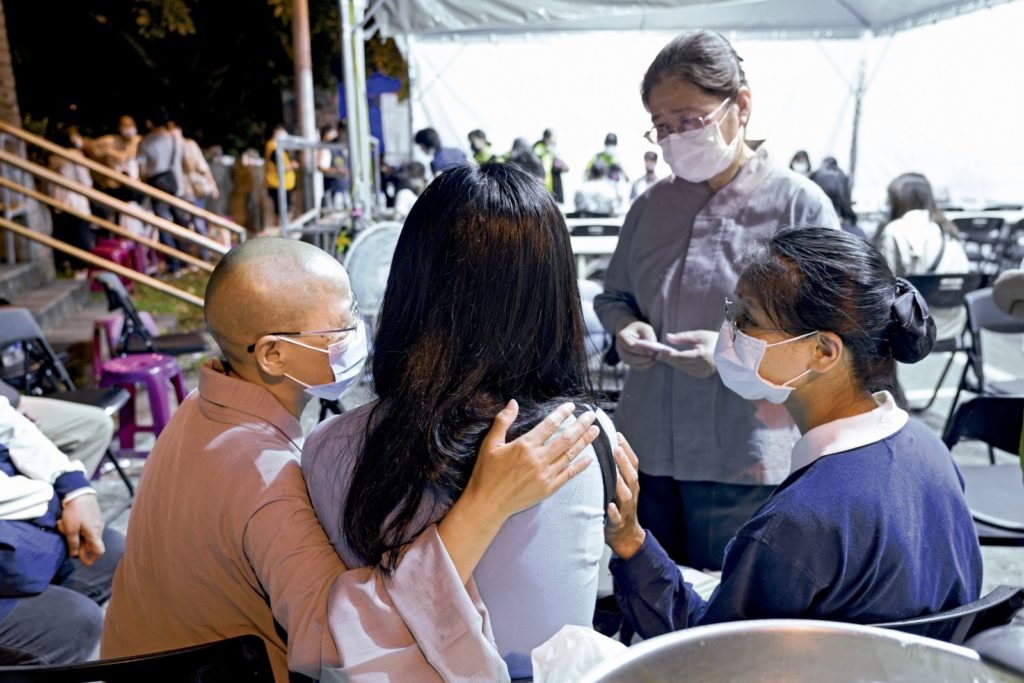
A nun from the Jing Si Abode and Tzu Chi volunteers comfort a bereaved family member at the Hualien Funeral Home.
The Most Difficult Mission
Most of the people who died in the accident had been killed on the spot. With so many lives gone so suddenly, how to comfort and soothe the bereaved became another major and difficult task. In fact, it was the most difficult mission of all.
Tzu Chi volunteers arrived at the funeral home at five that afternoon to provide help and support to families. In response to a request from the Hualien County government, volunteers kept the grieving families company and provided them with transportation. They worked in two-hour shifts to serve the families day and night. Volunteer Lu Feng-ying (呂鳳瑛) worked a shift from 11 p.m. April 2 to 1:00 a.m. the next morning. "We're using two vehicles to take the grieving families back to their hotels," she explained. "Tomorrow we're taking them to buy clothes for their deceased loved ones."
Although it was very late, Lu checked the supplies at the service station set up by Tzu Chi at the funeral home. There were bread and bottled water, bananas for a quick replenishment of energy, and face masks for families to wear as they rushed between the accident site and the morgue.
Around midnight, two volunteers who had taken some family members to their hotel returned to the funeral home. They were Li Si-bei (李思蓓), an administrative worker at Hualien Tzu Chi Hospital, and her husband, Feng Qing-rong (馮清榮), who also works at the hospital. From the time the hospital had issued Red Alert No. 9, Li had thrown herself into caring for survivors and families. It was very late at night when she returned to the funeral home, and even though she would have to go to the hospital the next day to provide more care and help to the injured, she wasn't ready to call it a day. She wanted to spend more time with the bereaved still at the funeral home and help them in whatever way she could.
No matter the depth of their pain and loss, the bereaved had no choice but to accept the cruel fact that their loved ones were no longer with them. On April 3, the day after the accident, the grieving families returned to the disaster scene in six tour buses for a traditional ritual to call the spirits of their loved ones home. Each family was accompanied by two Tzu Chi volunteers.
With their eyes red from crying, the families called out the names of their loved ones and said with trembling voices, "Let's go home." The Tzu Chi volunteers accompanying the families had a difficult time holding back their tears, but they stayed close to them, offering their staunchest support.
"Someone has fainted!" a person on-site cried out. One woman, overwhelmed by grief, had collapsed. Volunteers Liu Li-qing (劉麗卿), Zhang Qi-fu (張其富), and David Liu (劉濟雨) escorted her away from the scene. Carrying her with a plastic chair, the three stumbled along a slope covered in dust, all the while gripping the chair tightly and using their upper bodies to protect the woman from falling off the chair.
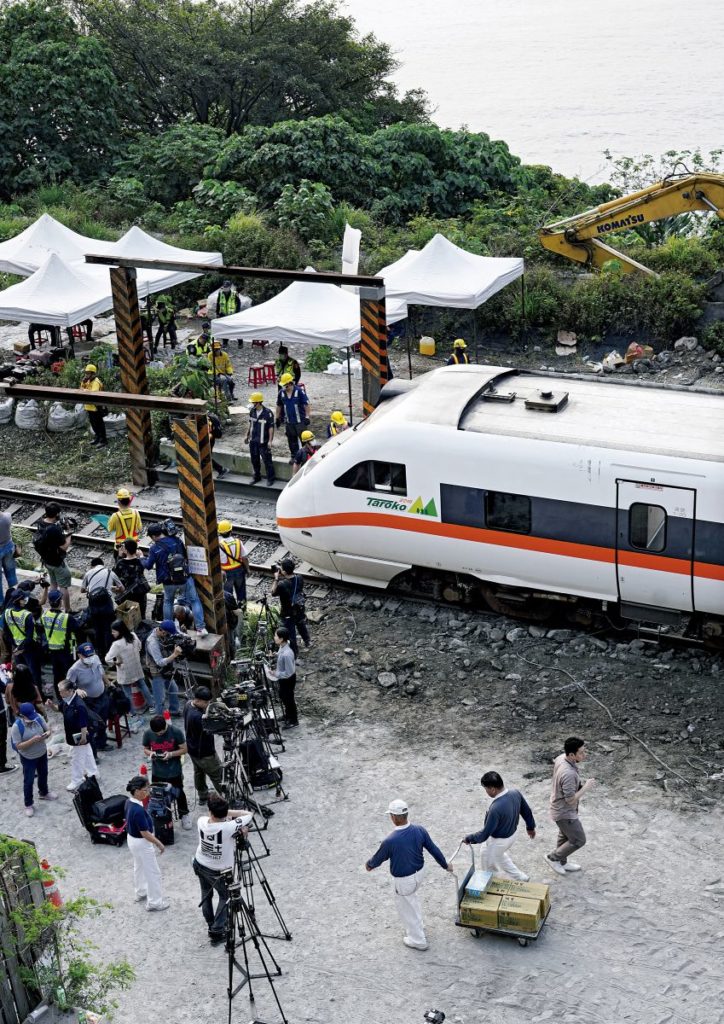
Early in the morning of April 3, Tzu Chi volunteers deliver breakfasts prepared by nuns at the Jing Si Abode to the disaster site for rescue workers, other helpers, and reporters to eat.
Empathizing with Their Pain
"I was in the sixth car, in seat No. 30," said Lin Qiu Xiu-rong (林邱秀絨), a passenger on the train. "I took a nap as soon as I boarded the train, and I used the restroom when I woke up. When I returned to my seat, I started reading. Before long, I felt the train lurch to a sudden stop, followed by people screaming and crying out." Lin, who lived in New Taipei City, northern Taiwan, was one of the seven Tzu Chi volunteers on board the train. Already 83 and a great-grandmother, she displayed a remarkable calm, without a trace of anxiety, as she recalled the accident.
Lin had taken the train to go to Hualien to volunteer at the Jing Si Abode. Who was to know that life's impermanence would strike her during the trip? After the crash, the carriage she was in was a mess. The electricity had been cut, causing the lights and air conditioning to stop functioning. Dozens of passengers, some crying, were stuck in the dark, stuffy space. Lin soon began to experience difficulty breathing. Thankfully, a man, braving injury to himself, used all his force to break two windows to allow air in. The difficult situation in the car was thus relieved a little.
The rescue team arrived not long after. They used demolishing equipment to create an escape route, then guided the passengers out of the train via a partially opened door. Because that portion of the train was stuck in Qingshui Tunnel, there were no platforms outside for the passengers to land on when they stepped out of the train. The gap between the bottom of the door and the ground was quite big. To make it easier for passengers to disembark from the train, rescue workers found a large piece of luggage and put it beneath the door to serve as a temporary step. Lin, supported by rescue personnel, gingerly stepped onto the luggage, and from there to the ground. Once she was out of the carriage, she followed other passengers to the tunnel exit.
"I didn't feel I was injured in any way at first," said Lin. "It wasn't until I was sent to the hospital that I began to feel a bad pain at the bottom right of my ribcage." She was later transferred to Hualien Tzu Chi Hospital for a CT scan, which revealed a broken rib. She received a combination of Western medicine and traditional Chinese medicine treatment afterwards, and then had to recuperate for a week.
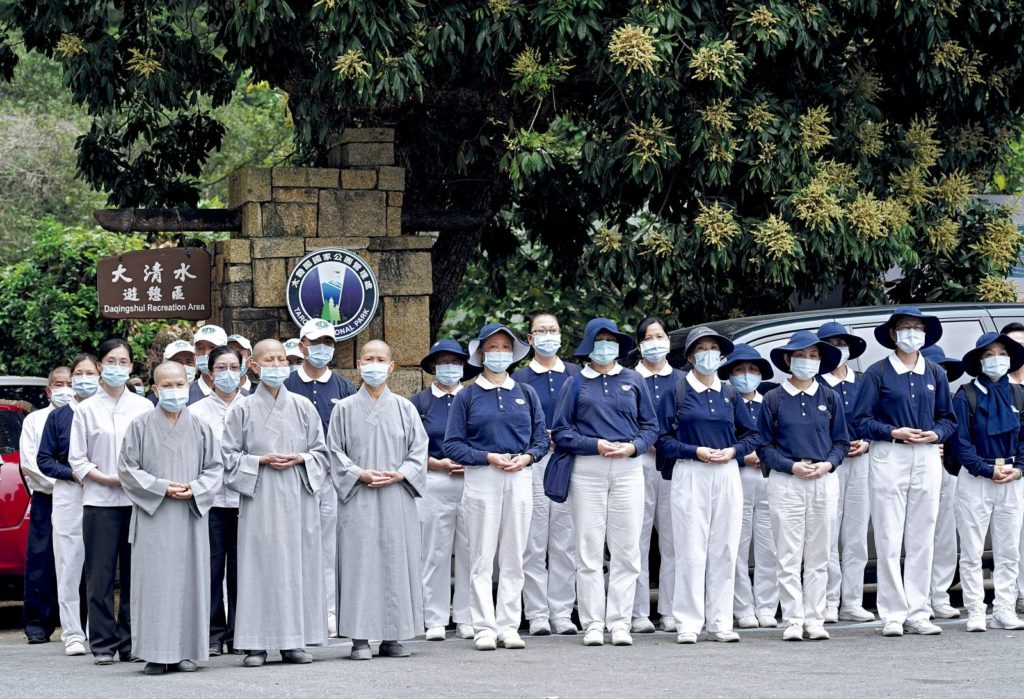
Jing Si Abode nuns and Tzu Chi volunteers wait near the crash site to accompany and offer support to families coming back to the disaster scene for a soul-summoning ritual.
Lin donated all the consolation money she had received from Taiwan's president, Tsai Ing-wen (蔡英文), the New Taipei City government, the Taiwan Railways Administration, Lions Clubs, Tzu Chi, and other organizations to Tzu Chi. She also pledged to do more good after the close brush with death. "As long as my body allows me, I'll work harder as a volunteer," Lin said. "I'm over 80, and so physically onerous tasks are beyond me. But I can still do work such as serving as a cooking volunteer. I have no problems washing and cutting vegetables and taking care of other kitchen duties."
Lin was one of the luckier ones among the passengers on that ill-fated train. Some never made it out alive. Families experienced excruciating pain when they realized they would never again see their loved ones. Tzu Chi volunteers accompanying grieving family members deeply empathized with them.
"My heart twisted into a knot when I saw the six tour buses carrying the bereaved arriving at the accident site for the soul-summoning ritual," said volunteer Zhong Su-zhen (鐘素真). "When they called out their family's names in tears, my heart felt torn to pieces."
Zhong had lost both of her parents just last year, and the experience this time once again engulfed her in sadness. But she tried her best to emerge from the sorrow. She advised everyone after this experience: Don't wait until it's too late to say, "I love you." Don't wait until it's too late to regret.
"I felt very comforted when I saw them finally able to eat a little," said another volunteer, Lin Hui-mei (林慧美), who had had more than 40 years of experience in conducting home visits to the needy. She provided emotional support to the bereaved, and urged family members who had lost their appetite due to sadness to at least eat some food to keep up their strength. She was surprised at how much witnessing the families' grief distressed her afterwards.
"I returned home from the soul-summoning ritual so upset I couldn't fall asleep that night," Lin said. "I kept thinking to myself, 'Life is so full of suffering.'" She was so distressed she almost lost the courage to go to the funeral home again the next day to volunteer. But as she watched a televised Dharma talk given by Master Cheng Yen the following day, she thought of how hard the Master had been working to help needy and hurting people. This helped her muster the courage to show up at the funeral home. Despite feeling tired from inadequate sleep, she helped out at the funeral home, serving grieving families and keeping them company. When it was time to eat, even though she had no appetite, she forced herself to finish the boxed meal prepared by nuns at the Jing Si Abode so that she could have enough energy to serve others. "The food was so delicious," Lin said. "Eating it, I was instantly rejuvenated. I was so grateful to the nuns, so moved." This just goes to show that when life is difficult, it's the love and care from others that sustain us and keep us going.
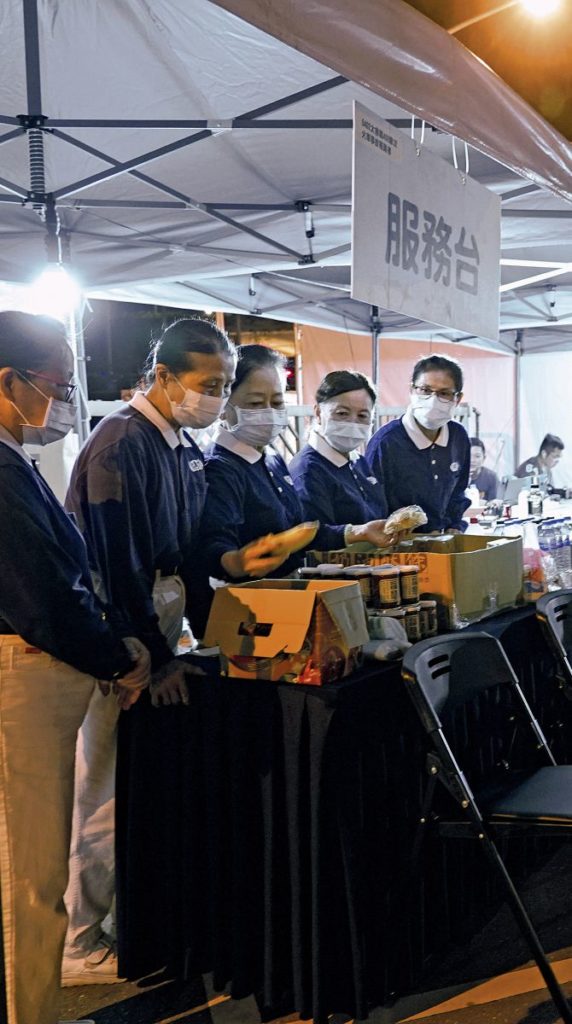
Volunteers set up a service station at the funeral home, providing drinking water and refreshments and taking care of other needs of the bereaved families and workers on-site.
Accompanying Them Out of the Tunnel
When devastating disasters happen and result in heavy casualties, the impact of death can be so huge that even frontline rescue workers and support volunteers are traumatized in the process. Tzu Chi volunteers are no exception. Some volunteers, for example, broke down and burst into tears when they went before Master Cheng Yen and shared their experiences of helping survivors and families of those killed in the train accident.
Realizing how important psychological counseling and other similar forms of help are in the aftermath of a tragedy, Hualien Tzu Chi Hospital sent out doctors from the departments of psychiatry and traditional Chinese medicine to the Hualien Funeral Home after the accident to provide services. The healthcare professionals offered counseling, acupuncture, cupping therapy, and other treatments to help bereaved family members, Tzu Chi volunteers, and other helpers on-site relieve their stress.
"The psychological trauma people sustain during or as a result of a disaster could remain with them for a long time," said Dr. Li Zhuo (李卓), a Hualien Tzu Chi Hospital psychiatrist who served at the funeral home. "Aside from the people directly impacted in the disaster, their families, first responders, and other helpers can be similarly traumatized." He therefore reminded all Tzu Chi volunteers to take good care of themselves physically and emotionally, so that they could help more people.
Psychological counseling aside, this rail disaster has prompted Tzu Chi to speed up its efforts to provide first aid training to its volunteers. The Tzu Chi volunteers on board the train who were not hurt in the crash said that they regretted not having learned how to apply CPR (cardiopulmonary resuscitation), bind wounds, or provide other first aid skills. Had they had those skills before the accident, they might have been able to better help injured people at the disaster scene.
Lu Hsueh-cheng, of Tzu Chi's Disaster Reduction and Prevention Section, said that the foundation provides disaster prevention training to staffers and volunteers. "Essential first aid skills are taught in the training courses. If a volunteer has received such training, he or she will know a lot better what to do in an emergency situation or have more confidence about giving aid in such a situation."
The train crash shocked and saddened everyone in Taiwan. In the aftermath of this massive tragedy, nuns at the Jing Si Abode, as well as doctors and nurses, teachers and students, and staffers and volunteers from the four missions of Tzu Chi, all mobilized to help. Though Tzu Chi's emergency aid for the disaster has now come to an end, volunteers have continued to care for families who lost their loved ones. Fully aware of what lay ahead of them, Yen Po-wen (顏博文), CEO of the Tzu Chi charity mission, promised those impacted by the accident on behalf of Master Cheng Yen and all Tzu Chi volunteers: "Tzu Chi will be there for you through your long journey toward the healing of your physical and mental wounds."
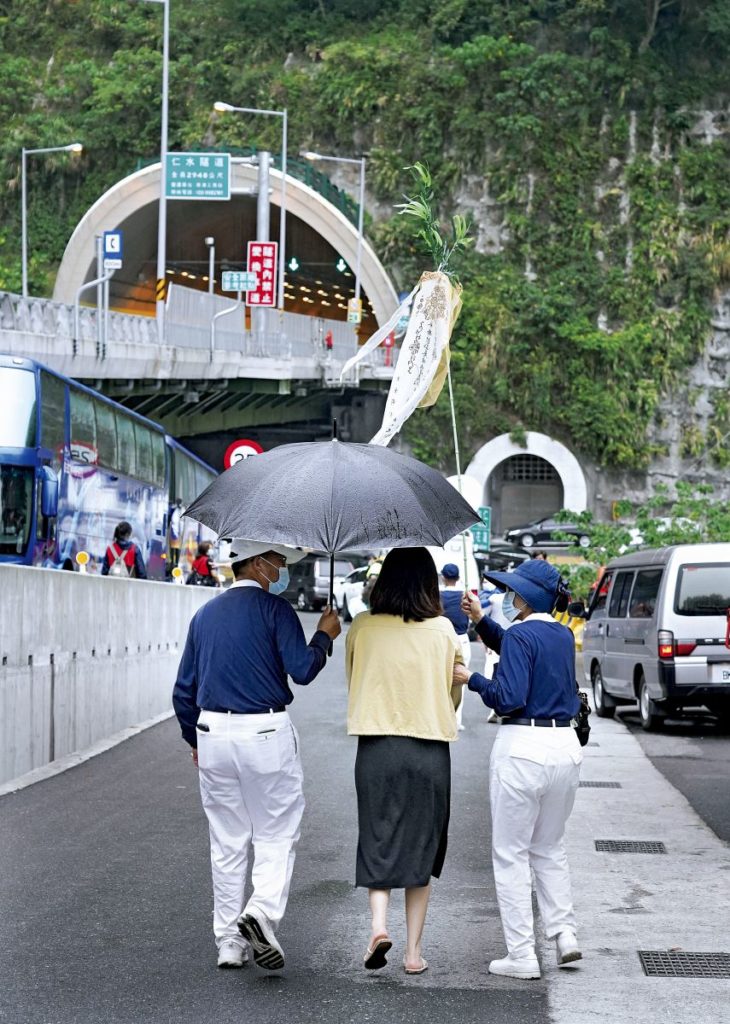
Volunteers assisted the bereaved in whatever way they could. They hoped that with their presence, the grieving families could at least have shoulders to lean on.
Contact Us | Plan a Visit | Donate
8 Lide Road, Beitou 11259, Taipei, Taiwan
886-2-2898-9999
005741@daaitv.com
©Tzu Chi Culture and Communication Foundation
All rights reserved.
